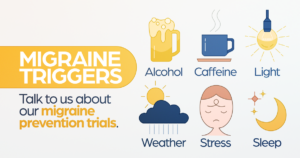As the crisp winter air settles over Seattle, many residents find themselves grappling with an unwelcome companion – migraines. The season’s cold temperatures, fluctuating weather patterns, and reduced daylight can contribute to an increased prevalence of migraines. Read more about the reasons behind the uptick in winter migraines and our tips for avoiding these debilitating headaches.
Understanding Winter Migraines:
Several factors make winter a challenging season for migraine sufferers. The following elements may contribute to the increased occurrence of migraines during the colder months:
1. Weather Changes: Sudden shifts in temperature, cold fronts, and changes in atmospheric pressure are common during cold weather. These variations can trigger migraines in susceptible individuals.
2. Dry Air and Dehydration: Cold weather often comes with dry air, both outdoors and indoors due to heating systems. Dehydration is a well-known migraine trigger, and the combination of cold weather and dry air can contribute to decreased hydration levels.
3. Reduced Sunlight Exposure: Winter days are shorter, leading to decreased exposure to natural sunlight. Lack of sunlight can disrupt circadian rhythms and affect serotonin levels, both of which are associated with migraines.
4. Cold-Induced Vasodilation: Exposure to cold temperatures can cause blood vessels to constrict and then dilate rapidly, leading to changes in blood flow. This process, known as cold-induced vasodilation, can trigger migraines in some individuals.
5. Indoor Allergens: Spending more time indoors during cold weather exposes individuals to potential indoor allergens such as dust mites, mold, and pet dander. Allergens can act as migraine triggers in some people.
6. Sinus Issues: Cold weather is often associated with an increase in respiratory infections and sinus problems. Sinus congestion and inflammation can contribute to migraines, especially in individuals prone to sinus-related headaches.
Tips for Migraine Prevention:
1. Stay Hydrated: Cold weather can lead to dehydration, a common migraine trigger. Ensure you’re drinking enough water, even if you don’t feel as thirsty in the winter.
2. Manage Stress: Practice stress-reduction techniques such as meditation, deep breathing, or yoga to navigate the challenges of the holiday season.
3. Regular Sleep Patterns: Maintain a consistent sleep schedule, even with the reduced daylight hours. Create a sleep-conducive environment and prioritize quality sleep.
4. Weather-Appropriate Attire: Dress warmly to protect yourself from the cold and sudden weather changes. Consider wearing a hat and sunglasses to shield yourself from harsh winds and bright sunlight, both of which can trigger migraines.
5. Healthy Eating Habits: Maintain a balanced diet rich in fruits, vegetables, and whole grains. Avoid skipping meals, as irregular eating patterns can contribute to migraines.
If you or someone you know in Seattle is struggling with migraines, it’s crucial to explore available options for relief. Consider participating in migraine clinical studies at Seattle Clinical Research Center. Clinical studies play a pivotal role in advancing migraine research and developing new treatment options. Your participation can contribute to a better understanding of migraines and may lead to improved therapies for individuals in our community.

Don’t let migraines dampen the winter spirit. Take proactive steps to manage and prevent migraines. Your journey to migraine relief starts today!




